Book contents
- The Cambridge Handbook of Compliance
- The Cambridge Handbook of Compliance
- Copyright page
- Contents
- Figures
- Tables
- Contributors
- 1 Introduction: Compliance as the Interaction between Rules and Behavior
- Part I Compliance Concepts and Approaches
- Part II Deterrence and Incapacitation
- Part III Incentives
- Part IV Legitimacy and Social Norms
- Part V Capacity and Opportunity
- 32 Do People Know the Law? Empirical Evidence about Legal Knowledge and Its Implications for Compliance
- 33 Self-Control and Offending
- 34 Substance Abuse, Self-Control and Crime
- 35 The Opportunity Approach to Compliance
- Part VI Compliance and Cognition
- Part VII Management and Organizational Processes
- Part VIII Measuring and Evaluating Compliance
- Part IX Analysis of Particular Fields
- References
33 - Self-Control and Offending
from Part V - Capacity and Opportunity
Published online by Cambridge University Press: 07 May 2021
- The Cambridge Handbook of Compliance
- The Cambridge Handbook of Compliance
- Copyright page
- Contents
- Figures
- Tables
- Contributors
- 1 Introduction: Compliance as the Interaction between Rules and Behavior
- Part I Compliance Concepts and Approaches
- Part II Deterrence and Incapacitation
- Part III Incentives
- Part IV Legitimacy and Social Norms
- Part V Capacity and Opportunity
- 32 Do People Know the Law? Empirical Evidence about Legal Knowledge and Its Implications for Compliance
- 33 Self-Control and Offending
- 34 Substance Abuse, Self-Control and Crime
- 35 The Opportunity Approach to Compliance
- Part VI Compliance and Cognition
- Part VII Management and Organizational Processes
- Part VIII Measuring and Evaluating Compliance
- Part IX Analysis of Particular Fields
- References
Summary
Abstract: Over the last three decades, self-control theory has established itself as one of the leading explanations of criminal and deviant behavior. At its core, the theory asserts that those with low self-control will be less likely to comply with the law (as well as other social norms). This chapter reviews the self-control perspective in terms of: (1) its origin and development within criminology, (2) its empirical status with respect to how well the theory predicts compliance/failure to comply with the law, (3) recent theoretical and empirical developments in the self-control model, and (4) what future research would be most useful to continue to explore in this theoretical tradition.
- Type
- Chapter
- Information
- The Cambridge Handbook of Compliance , pp. 489 - 498Publisher: Cambridge University PressPrint publication year: 2021
References
- 6
- Cited by

